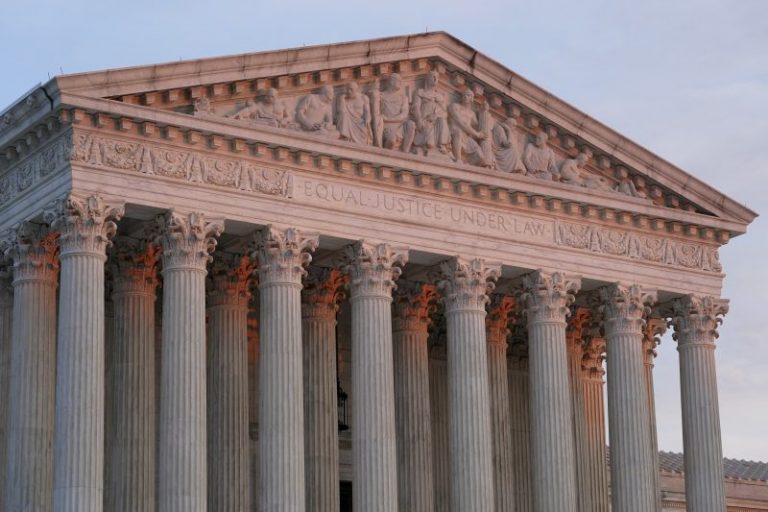The Supreme Court on Wednesday agreed New York’s new restrictions on carrying a concealed firearm can be enforced while legal challenges to the law continue.
It was the first time the court has dealt with legal challenges arising from its watershed decision last June that the Second Amendment generally protects the rights of law-abiding Americans to carry a handgun outside the home for self-defense.
In that case, the court’s conservatives prevailed in a 6-to-3 decision that struck a New York law requiring a special need for carrying a weapon, and put at risk similar laws in Maryland, California, New Jersey, Hawaii and Massachusetts. The 2022 ruling is likely to make it easier to carry guns in some of the nation’s biggest cities.
The current case regards New York’s response to last year’s decision. Eight days after the Supreme Court ruled in N.Y. State Rifle & Pistol Ass’n v. Bruen, the state legislature met in emergency session in Albany to pass the Concealed Carry Improvement Act (CCIA).
The bill sets out a lengthy list of places where guns would be barred, including bars, stadiums, subways and a broadly defined Times Square. Carrying a concealed weapon is prohibited on all private property unless the property owner explicitly states otherwise. And those who want to carry permits have to pass a character test, undergo 18 hours of training and disclose social media history and family members.
The law was immediately challenged by the organization Gun Owners of America and individuals, and judges have ruled against portions of the law in three separate cases.
But a three-judge panel of the U.S. Court of Appeals for the 2nd Circuit reinstated the law, and ordered expedited briefing on the merits of the lower court decisions.
The issue for the Supreme Court was whether to leave in place the 2nd Circuit’s order, or to allow the district court decisions that block the challenged portions of the law.
Those challenging the new law said the appeals court order had the effect of “indefinitely suspending the protections afforded New Yorkers by the Second Amendment and affirmed by this Court in Bruen.’ Their brief, which quoted extensively from a news conference that New York Gov. Kathy Hochul (D) gave after the court’s ruling in Bruen, said the new law was not an attempt to comply with the court’s June ruling, but to defy it.
“We are not going to cede our rights that easily, despite the best efforts of the politicized Supreme Court,” Hochul said then.
The brief, filed by a group of citizens, said the Supreme Court should block the law to ensure the decision it delivered in June was meaningful.
“Applicants, along with countless others like them, are being irreparably harmed each day this patently unconstitutional law remains in place, eviscerating the right of ordinary, law-abiding New Yorkers to carry firearms in public for self-defense,” the brief said. “Additionally, this case presents issues of national importance with respect to states that enact laws in explicit defiance of this court’s decisions.”
But New York Attorney General Lettia James (D) said it would be extraordinary for the Supreme Court to intervene at this time, while the appeals court is actively reviewing the law and the lower courts’ decisions.
“This case involves the application of Bruen, which was issued only six months ago and which revised the relevant constitutional framework for Second Amendment challenges,” the state’s brief says. “This court ordinarily awaits percolation of legal issues in the lower courts before granting review and would benefit from such percolation here.”
Justice Clarence Thomas wrote the majority opinion in Bruen. “The constitutional right to bear arms in public for self-defense is not ‘a second-class right, subject to an entirely different body of rules than the other Bill of Rights guarantees,’ ” Thomas wrote, referring to a previous Supreme Court ruling. “We know of no other constitutional right that an individual may exercise only after demonstrating to government officers some special need.”
He said judges should not weigh a law’s burden on the Second Amendment right and the strength of the state’s interest in imposing the challenge. Instead, “the government must demonstrate that the regulation is consistent with this Nation’s historical tradition of firearm regulation,” Thomas wrote.
The opinion did not address exactly how such decisions would be made. Chief Justice John G. Roberts Jr. and Justice Brett M. Kavanaugh wrote separately to emphasize that the opinion did not call into question the requirements that sometimes accompany “shall-issue” laws in 43 states.
“Those shall-issue regimes may require a license applicant to undergo fingerprinting, a background check, a mental health records check, and training in firearms handling and in laws regarding the use of force, among other possible requirements,” Kavanaugh wrote.

